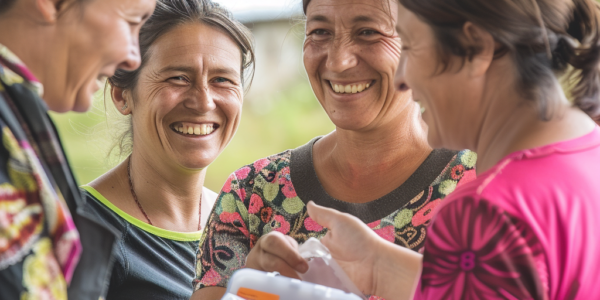Woman’s Dangerous Weight Loss Attempt with Gray Market Semaglutide
A woman’s attempt to slim down for her wedding took a dangerous turn when she took gray market semaglutide, landing her in the emergency room. Despite severe stomach problems, she continued taking the drug to maintain her weight loss, only to wake up after her wedding with severe stomach pain and an infected appendix. This incident serves as a cautionary tale about the dangers of obtaining medications from unregulated sources and the potential risks associated with using them without medical supervision.
New Study Reveals Promising Findings in Prostate Cancer Research
The latest study in prostate cancer research has revealed promising findings that could revolutionize the way high-risk prostate cancer patients are identified. Prof David Wedge of Manchester Cancer Research Centre has discovered that the most common type of prostate cancer has two distinct ways of developing in the body, potentially opening up new avenues for targeted treatment. This groundbreaking research could potentially lead to a significant shift in the way high-risk prostate cancer patients are identified and treated, offering hope for more targeted and effective interventions.
Unraveling the Mysteries of Chronic Itching
Chronic itching can have a significant impact on an individual’s quality of life, yet it remains poorly understood. Researchers are working to unravel the mysteries behind chronic itching, including its connection to underlying health issues such as kidney or liver disease. Dr. Rachel Asiniwasis, a dermatologist, emphasizes that chronic itching can be as detrimental to patients as chronic pain on a mental health level, shedding light on the often misunderstood nature of chronic itching.
MRI Monitoring Reduces Breast Cancer Mortality in Women with BRCA1 Mutations
An international study published in JAMA Oncology reveals that MRI monitoring in women with BRCA1 gene mutations significantly reduces breast cancer mortality without the need for preventive mastectomy. The research, including data from 2,488 women from 59 centers in 11 countries, highlights the importance of early detection and non-invasive monitoring techniques for managing breast cancer risk in high-risk women.
Groundbreaking Discovery in Understanding HHV8-Induced Cancer
Cleveland Clinic scientists have discovered how HHV8 induces cancer by manipulating human enzymes and reshaping cell metabolism. This groundbreaking research could lead to effective treatments for virus-associated malignancies, including repurposing existing FDA-approved drugs to inhibit HHV8-associated cancers. The study also has broader implications for developing targeted treatments for other virus-induced cancers, offering hope for improved outcomes for patients with these malignancies.
Transforming Health Care: Fighting Cervical Cancer in Marginalized Communities
Home-test kits and mobile labs for detecting cervical cancer are transforming health care in remote or marginalized communities. Magdalena Rothova, director of the Association for Culture, Education and Communication (ACEC) in Slovakia, is leading the charge to reduce deaths from cervical cancer in Europe. By empowering marginalized communities with the tools for early detection and intervention, initiatives like the PRESCRIP-TEC project are paving the way for improved cervical cancer outcomes in regions where access to traditional screening methods may be limited.
Wildfire Smoke Disproportionately Affects Indigenous Communities in California, New Research Shows
New research reveals that Indigenous communities in California are disproportionately affected by wildfire smoke, being exposed to significantly higher levels of dangerous particulate matter than previously known. The study’s unique metrics for measuring exposures shed light on the significant impact of wildfire smoke on these communities, highlighting the need for comprehensive strategies to mitigate these effects.
Personal trainer nearly dies from Covid-19 blood clots
Personal trainer Becky Fanthorpe, 39, nearly died from blood clots in her legs, stomach, and lungs caused by Covid-19. Despite initial dismissal of her symptoms, subsequent tests revealed blood clots throughout her body. A year later, she credits her love for cooking with helping her through her darkest days and now shares her favorite recipes with her 11,000 online followers.
Schizophrenia linked to increased risk for subsequent CVD events
A study published in the Journal of the American Heart Association found that schizophrenia is associated with an increased risk of subsequent cardiovascular disease (CVD) events, with the association stronger in women. The researchers observed a significant relationship of schizophrenia with an increased risk for developing composite CVD events in both men and women, with a stronger association seen in women. The study suggests a need for greater support for individuals, particularly women, with schizophrenia, and for psychiatrists, cardiologists, and general physicians to apply these findings to CVD prevention.
WHO Releases Details on Fatal Nipah Virus Cases in Bangladesh
The World Health Organization (WHO) has released new details regarding two fatal cases of Nipah virus infections in Bangladesh. The cases, which were confirmed before February 9, resulted in the deaths of both patients. The individuals, a 38-year-old man and a 3-year-old girl, were from Dhaka division but from separate districts and were not epidemiologically linked to each other, according to a statement from the WHO. The man’s symptoms began on January 11, and he passed away on January 28 after testing positive for Nipah virus. It was discovered that he had consumed raw date palm sap, a practice known to increase the risk of contracting the disease. Despite efforts to educate communities about the risks, public health officials continue to warn against drinking raw date palm sap due to potential contamination with bat droppings containing the virus. The second patient, a 3-year-old girl, was isolated in a Dhaka city hospital on January 30, and her Nipah virus infection was confirmed the following day. Investigators found that she had regularly consumed raw date palm sap. However, all 67 of her contacts tested negative for the virus. The WHO emphasized that the risk to Bangladesh is moderate, citing the high case-fatality rate and ongoing consumption of raw date palm sap. Additionally, the regional risk is considered moderate due to Bangladesh sharing an ecological corridor with India and Myanmar for the bats that are the natural Nipah virus hosts. Currently, there are no vaccines or treatments for Nipah virus, which has been classified as a priority disease for countermeasure research and development.










